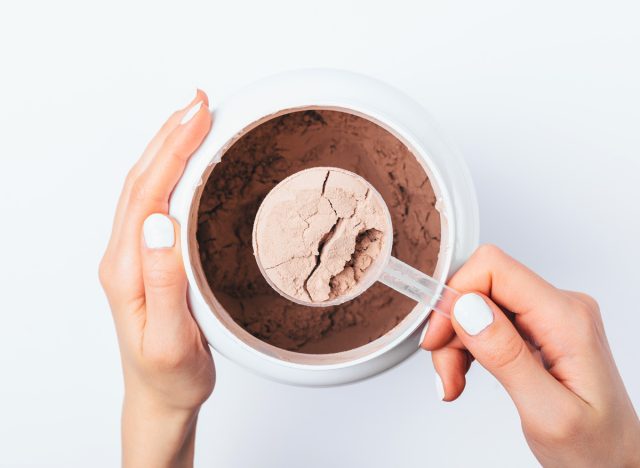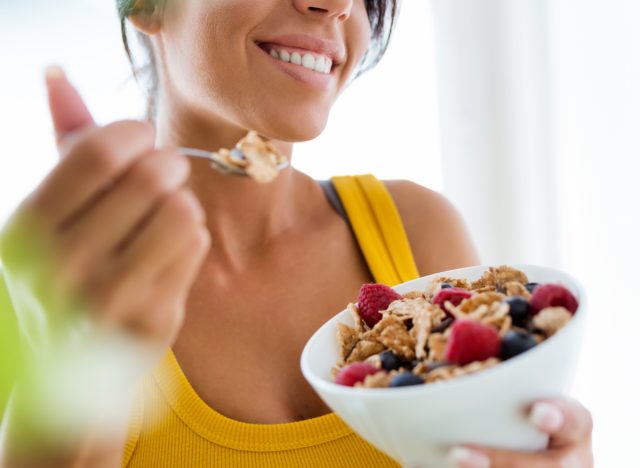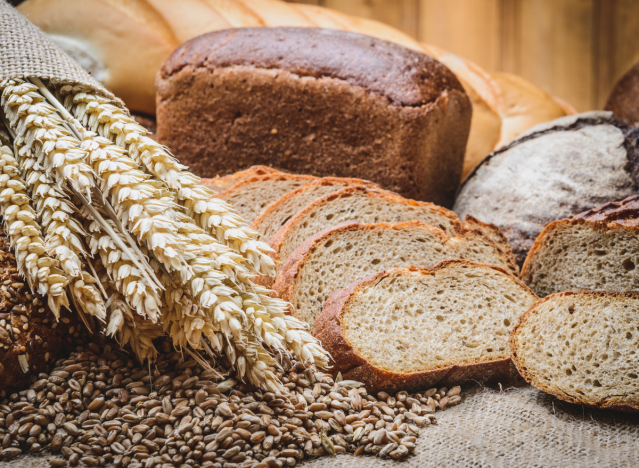The 4 Best Breakfast Habits for Your Waistline

Breakfast can hands down be the most important meal you eat every day. The meal sets the tone for the rest of your day and can provide you with a way to eat healthy foods first thing in the morning. However, because breakfast is so important to the rest of your day, it can also derail your health goals depending on what type of breakfast you eat.
If you want to lose or manage your current weight, breakfast can be a helpful way to get the necessary nutrients in order to help you meet your goals. To learn more, we talked with Courtney D’Angelo, MS, RD, author at Go Wellness, about specific breakfast habits that are helpful for your waistline.
Add more protein.

Oftentimes people will be trying to lose weight without focusing on how much protein they’re getting in their day, but protein is one of the most important nutrients for your weight loss goals.
“Protein is essential for building muscle and reducing fat, and it’s one of my main recommendations for anyone who’s trying to lose weight, especially around the waistline,” says D’Angelo. “Consuming enough protein has shown to help you feel full longer, which is vitally important if you have a habit of snacking on more sweets or unhealthy snacks after breakfast.”
If you’re looking to add more protein to your breakfast, you could try foods like eggs, Greek yogurt, cottage cheese, or black beans, “or you could make a bowl of oatmeal and add in a scoop of your favorite whey protein,” says D’Angelo.
Eliminate sugar when you can.

Many of the most beloved breakfast items come packed with added sugar, but this can, unfortunately, have a negative impact on our health goals if consumed on a regular basis. Because of this, D’Angelo suggests limiting your consumption whenever you can.
“People use sugar from their morning cup of coffee to eating pastries, donuts, or cereal as a breakfast meal, and too much sugar will make you want to consume more sugar throughout the day,” says D’ Angelo. “These sugary sweets, snacks, foods, or drinks also carry more empty calories, which can lead to weight gain, and a chance to develop type 2 diabetes.”
According to the Dietary Guidelines for Americans, it is suggested that adults consume no more than 50 grams of sugar daily, but ideally no more than 25 grams. If you can, maybe switch out a pastry for a slice of whole grain toast and your favorite nut butter.
Drink more water.

“I have a glass of water when I wake up and one with breakfast because water keeps you hydrated, which in turn provides more energy and the body will function more effectively,” says D’Angelo. “The benefits can be even greater for some people who replace a sugary beverage with water because they are automatically cutting back on sugar and calories.”
Drinking water before breakfast has been found to help reduce appetite, and one study found that water may help improve metabolism. It’s also important to drink enough water not just at breakfast, but throughout the day to help keep your digestion moving.
Eat more whole grains.

“If you eat toast for breakfast, you may want to stay away from white bread and switch to whole wheat bread,” says D’Angelo. “Evidence has shown that eating whole grains can decrease the calories retained in your body and increase your metabolism at the same time.”
Whole grains, which include wheat, barley, oats, and rice, also contain much higher levels of fiber than white bread since they haven’t been as heavily processed. Fiber can help digestion and keep you feeling full and more satisfied for longer periods of time.









